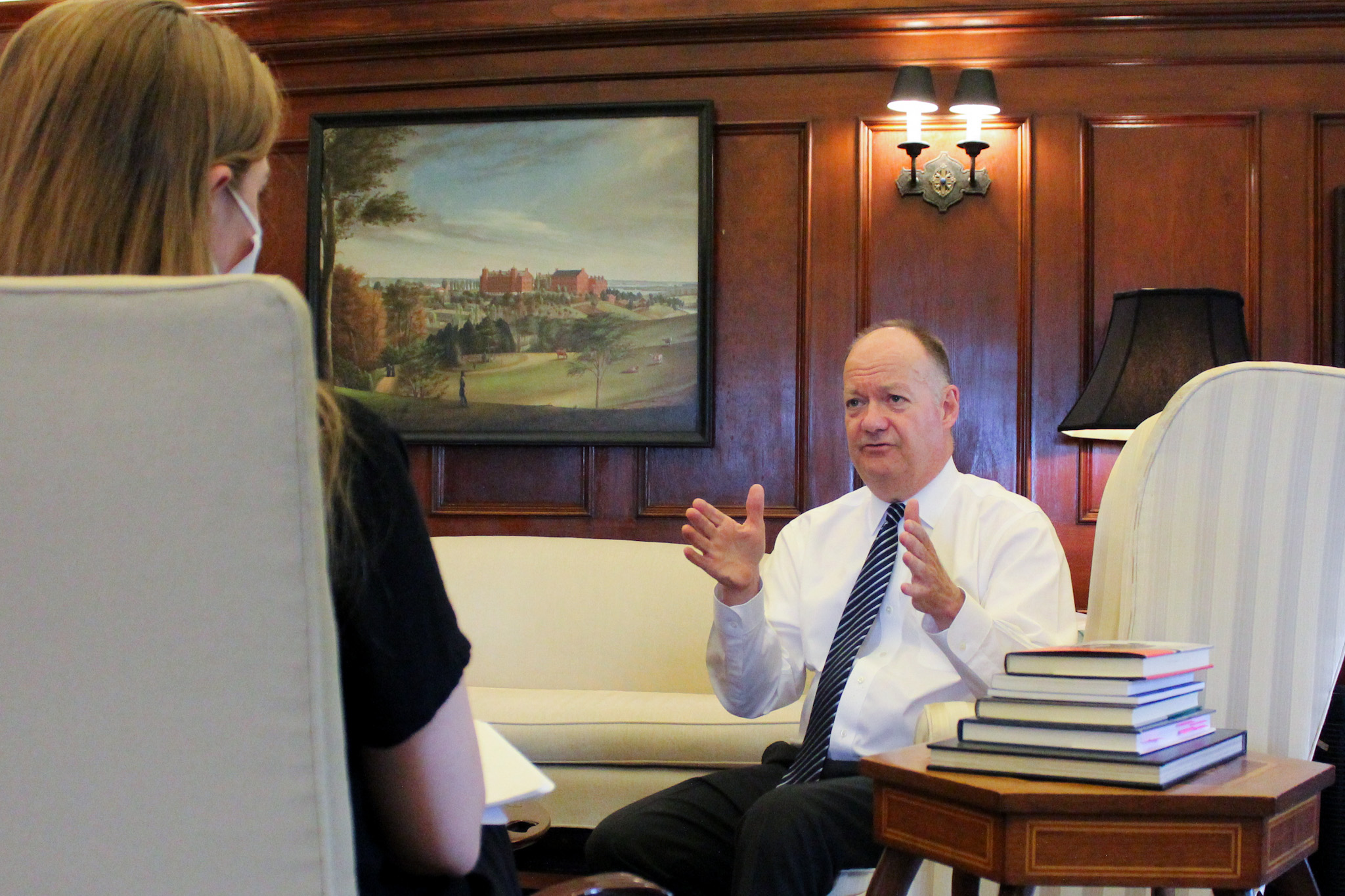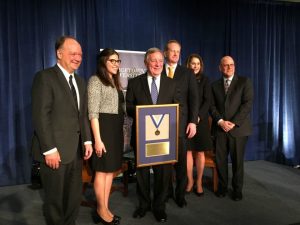Every semester, the editor-in-chief of the Voice has sat down with President John DeGioia to talk through pressing issues facing the Georgetown community. While the tradition went on hiatus during the pandemic and has since been more intermittent, fall Editor-in-Chief Nora Scully (SFS ’24) sat down with DeGioia on Sept. 7 to talk about institutional commitments and answer timely questions for Hoyas. The interview was limited to 30 minutes, meaning there are topics of import that were not discussed, but within the piece is support for class-conscious admissions, an internal and external review of GUPD, and more.
Affirmative Action
On June 29, the Supreme Court ruled affirmative action unconstitutional in the cases of Students for Fair Admissions v. President and Fellows of Harvard College and Students for Fair Admissions v. University of North Carolina.
“We’re disappointed in the decision,” DeGioia said. “We know it’s going to require some new work on our part, and we had anticipated that.”
DeGioia’s response revealed significant forethought to the ruling. According to him, over 40 senior staff—including vice presidents, executive vice presidents, deans, and critical program leaders—have been going on “routine” off-site retreats for the last two years to prepare for the decision.
He also discussed the work of several key individuals who are tasked with bringing the school in line with the court’s decision, including Georgetown Law Center Dean of Admissions Andrew Cornblatt and head of undergraduate admissions Charles Deacon.
“[They] are all coming to terms with what nuances will need to be implemented to ensure that we’re in compliance with the law while, at the same time, trying to ensure that we achieve the level of diversity that we need to accomplish our mission,” he said.
The university has previously declined to comment on specific changes that would be made to the admissions process to protect diversity, which it has stated is key to the university’s Jesuit spirit. In this interview, however, DeGioia confirmed that class-conscious admissions—recognized by experts as an alternative to race-conscious admissions—are likely in the university’s future.
“The best option we have available to us is a greater focus on socioeconomic diversity,” he said.
The president also emphasized the work of the Georgetown Scholars Program (GSP), a program founded in 2006 to support first-generation, low-income students, as well as a new fundraising campaign, “Called to Be”, which started in 2019 and formally launched in March of 2023. It is expected to raise $3 billion dollars in the next three years.
“Our single biggest goal on the campaign is financial aid,” he said. “The goal we established is $750 or $800 million of the $3 billion is for financial aid. That will double what we did in the last campaign for financial aid. So we’ve got a lot of work to do, but we’re on our way.”
Staff and facility turnover
In the last year, the Voice has reported on staff turnover and retention in a variety of organizations—the Center for Student Engagement, LGBTQ+ Resource Center, and facilities workers. The Women’s Center and Disability Cultural Initiative were also maintained as single-person offices, impacting institutional memory and center functions when staff members left, according to students.
DeGioia noted that the university maintained a low turnover rate during the pandemic, less than the 15-17 percent of a typical year. The next two years, however, he acknowledged that the university saw “a lot” of turnover, especially in student-facing positions.
“We’re still coming to terms with what did that mean,” DeGioia said. “Were we differentiated in any way from the rest of the employers here in the city?”
While DeGioia didn’t believe the problem was unique to Georgetown, he highlighted unusually long continuity in some student-facing positions, including the loss of Vice President for Student Affairs Todd Olson who left in 2021 after 18 years, and Sivagami “Shiva” Subbaraman, who served as the director of the LGBTQ+ Center for over a decade.
“Do I miss some of the institutional memory and do I miss colleagues? For sure,” DeGioia said. “We were going to need to manage a transition at some point. We’re managing that now, and I think the steps that have been taken have been terrific.”
Georgetown University Police Department
GUPD has a history of racial violence on campus, which has become a topic of student protest and activism for years. It was most recently highlighted by the protestors at the Black Survivor’s coalition sit-in and the sit-in organized by Georgetown Protects Racists (GUPR). GUPD’s handling of Lahannah Giles’s (COL ’23) hate crime footage fell under intense scrutiny from the student body in December, prompting multi-day sit-ins outside the president’s office and a march for justice across campus.
Giles was told three separate narratives relating to GUPD’s security footage, with the university ultimately concluding that the footage was lost due to a server failure. Part of the negotiations with student activists resulted in a pledge to internally review several offices, including GUPD’s, involvement in the case.
“Following those commitments, our new vice president, Eleanor Dougherty, established three working groups—one focused on communal space, one focused on working with a larger group of student organizations, third looking at bias reporting,” DeGioia said. “We also brought from the outside, someone to take a look at how we do things and how we responded, and also we did an internal review led by Rosemary Kilkenny.”
The external review has concluded, DeGioia noted in his interview. The university declined to make public the report from the external reviewer—a “national expert in student affairs, including diversity, equity and inclusion initiatives, wellness, and student conduct”—according to a follow-up sent to a university spokesperson, who noted that Georgetown’s leadership is reviewing the report’s recommendations.
The internal review, led by Kilkenny, vice president of Diversity, Equity, Inclusion and chief diversity officer, reviewed a number of individuals related to the investigation, and is currently in the process of drafting its recommendations, according to a university spokesperson.
DeGioia additionally highlighted the department’s annual bias training (although the program predates the sit-in) and the hiring of a new police chief, Katherine Perez. He also noted the creation of a temporary Black Student Affinity Space in LXR as a delivered commitment from the sit-in.
“We hope to be better in every future case, but it was a very thorough investigation when all was said and done,” DeGioia said. “Unfortunately, we weren’t able to find the perpetrator, but it did require the most careful engagement.”







